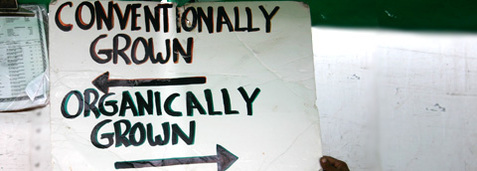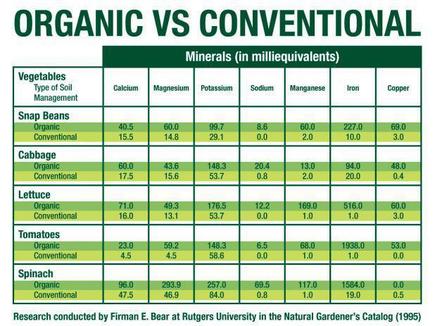
Equally respected NPR correspondents, Allison Aubrey and Dan Charles, were there to talk about the nutritional value of organic food, or the lack there of. Even if it is true, which I don't believe it is, why even fill the airwaves with fodder for the opposition to say, "See, we told you so." Especially, when there are studies that show organic food really does have a higher nutritional value than conventional like the one released by Organic Farming Research Foundation this past August entitled "Organic Farming for Health and Prosperity." And if these counterpoint studies do exist, proper editorial would compare both not just present one side of the story.
But that's not what irks me! It's the other half of the story, the most important part of the story, that they marginalize...eating sustainably grown food is really more about the ecological benefits than the nutritional benefits. Synthetic fertilizers and pesticides kill the soil food web disabling its biological functions to provide food to plants, store carbon and retain water. 70% of the chemicals used on crops aren't even absorbed by the plant. They run-off contaminating ground water and contributing to the oceans' dead zones which increases the effects of global warming. Bottom Line...choosing organics goes way deeper than nutrition. it is an ethical and lifestyle choice.

Allison and Dan do mention the environmental upside to organics but by that point in the interview, all that people are thinking is..."Did I just spend too much at the grocery store today on organics?"
When the news dumbs-down the story and doesn't provide the full picture, we stop thinking critically. If the news doesn't present both sides equally then we only hear what they want us to hear..."organic food is not any more nutritious than conventional."
Alison and Dan did not linger on the environmental attributes which would have helped bring people around. And David and Steve did not bother to challenge them. The inclusion of organics' redeeming qualities was on the downside of the story and was mentioned as an after thought. Are they shortsighted, or just too busy reporting the facts than to really take beef with this bologna study?
Under-reporting is a problem in many parts of the news...people will talk about offshore oil reserves, the abundance of domestic coal and natural gas as a cleaner fuel. If the situation was that cut-and-dry then yes, let's get after that energy independence. But the ugly truth is in the extraction process of those fossil fuels and their degrading impacts on the land, the ocean wilderness and the neighboring communities. Like food, it is not just about the end product, it is about the means to get there and the toll it takes on the environment and people. We need to think holistically when considering these options. And the news needs to present it in such a way so people can make an educated opinion based on this holistic picture.
Farming ecologically is about taking care of the land so it can feed the next generation and the many generations after that. It is about treating livestock humanely and allowing them their innate right to interact with the land and work together to build a healthy agro-ecosystem. Sustainable farming practices are focused on the long-term whereas conventional is focused on the short-term. To feed the world, we need to start thinking long-term!
I started writing this post yesterday and already, the news wire is filled with angst against this study. I opened my home page just a little while ago and Grist.org had their review of the study front and center! Even if NPR, can't see past the end of their nose on this one, their media allies will get their back and help bring them along. Don't worry NPR, I still love you!

 RSS Feed
RSS Feed
